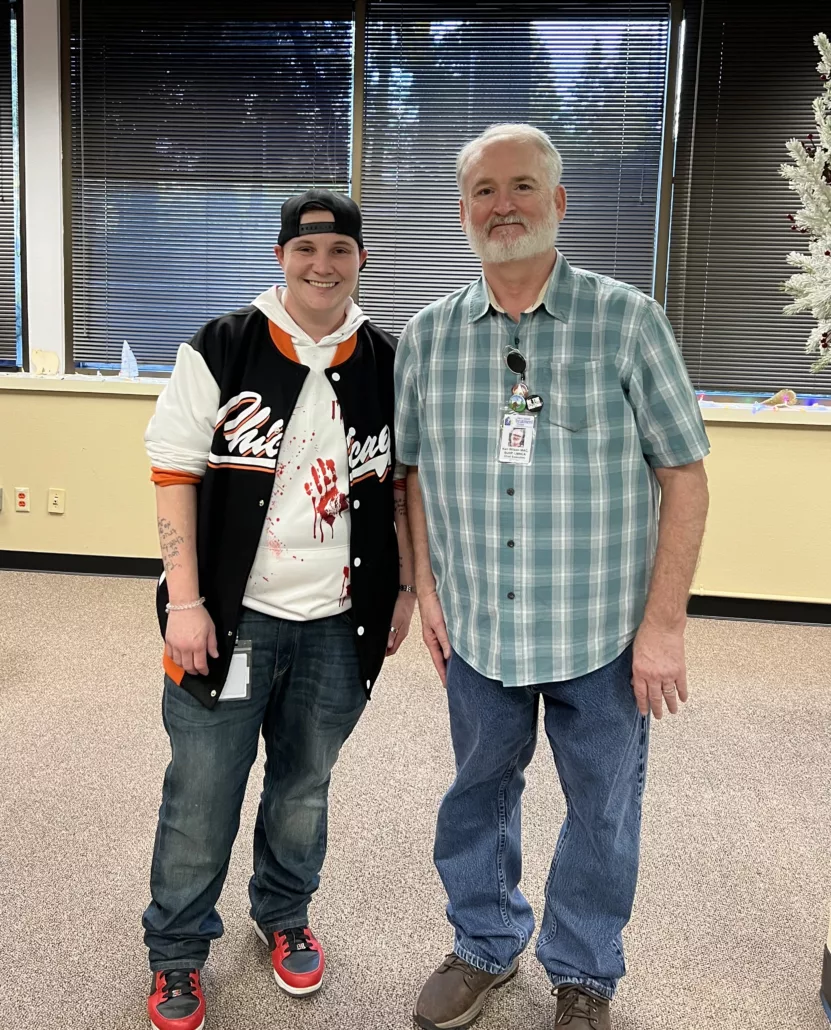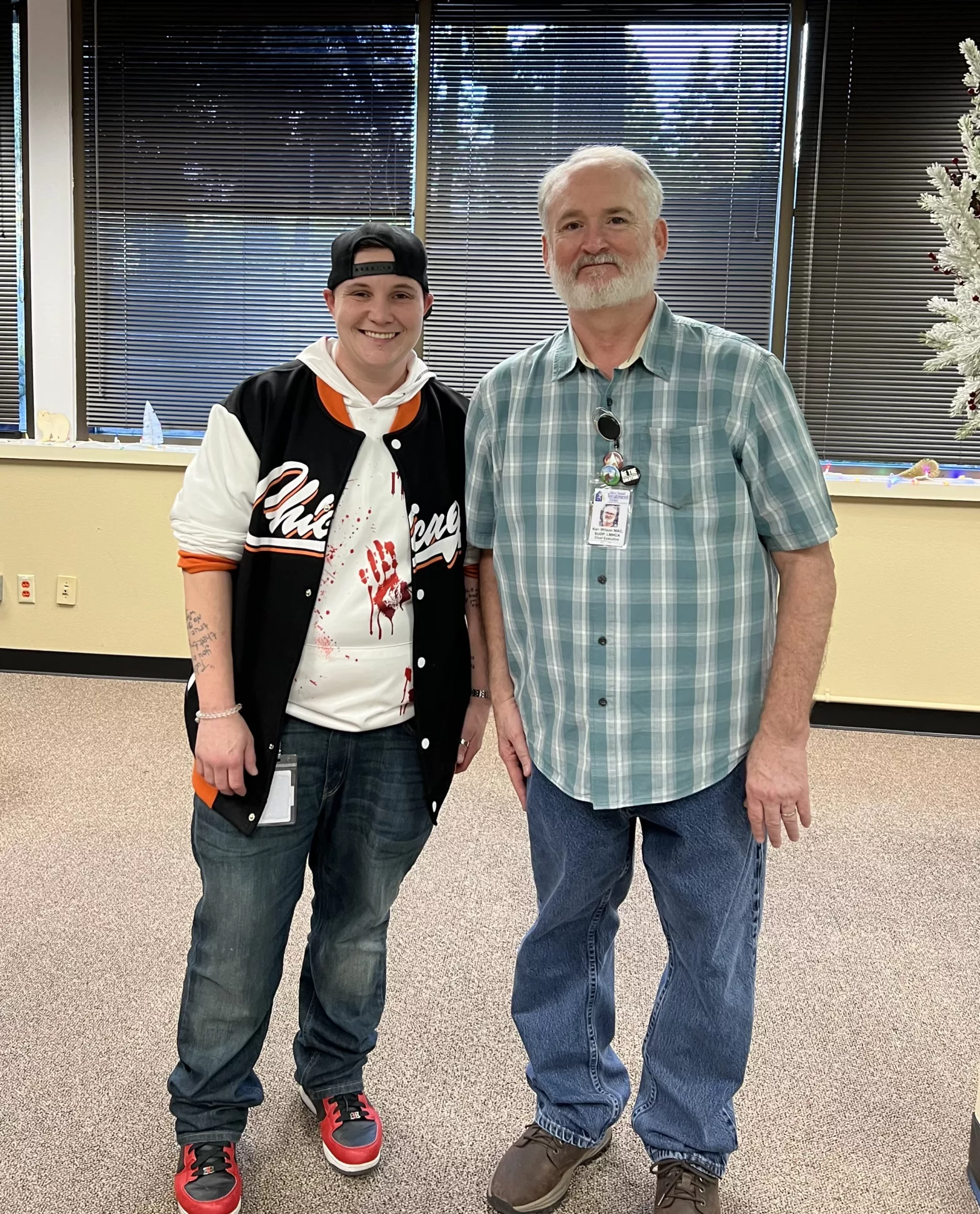The Voices in Recovery award highlights those in the recovery community who stand out for the work they do to help people who can’t always speak up for themselves. Part One of this blog shared about Deputy David Wolner receiving the award this year because of his role as law enforcement whose voice is making such a difference. In Part Two, we honor the WSTC staff member who also received the Voices of Recovery award.
According to CEO Ken Wilson, this staff member presents as a bit of a miracle in many ways. Ken said, “We always hope for the magic to happen and see a life transformed, but it is rare to see a transformation this bold. Many factors affected this transformation, but most importantly, this person stepped up to make a difference for himself. Something sparked, and he came alive. It wasn’t an easy road, but it was successful, with a renewed spirit.”
This recipient goes above and beyond for not only the people in his life but for WSTC participants as well. He stays eager to learn about everything and anything and honestly has no issues asking questions if he does not know the answer. His work in the community also makes this person stand out — he fits the picture of a helper. He spent time volunteering with a group called Rock the Block working with the unhoused population. In August of 2023, this recipient applied at WSTC and was hired as part of our REAL Team. He has helped many get up and get on with their life, proving himself invaluable to this community.

This Voices in Recovery award goes to Frankee Brezacek in appreciation for all he does for the community. Here is what Frankee had to say about his voice in recovery in his own words.
What does it mean to you to be a voice in recovery?
Being a voice in recovery means being someone that is there for others. Being that person who everyone knows that no matter what, you are going to suit up and show up for them. That you will always have their best interest in mind. Being a voice in recovery means not only being an advocate for those who need help the most, but also being an ear for them. Those who ask for my help don’t only get my experience, strength, and hope, but also a very solid listener — something that a lot of people are missing these days. Many people listen to what others have to say, but do they really hear what they are trying to express? Recovery is found everywhere in my opinion; it doesn’t matter if you’re sitting in a treatment center, living in a tent somewhere, or walking down the streets. You absolutely can find some type of recovery in any walk of life.
Is there any aspect of the work that particularly inspires you?
What inspires me is that I inspire other people — that I get to plant the seeds of recovery and help water and watch it grow in those who want it. Recovery is a scary thing, to give up everything you are so comfortable in and become uncomfortable to grow. My job fulfills so much in my life. The best aspect of it is when you help someone, and they look at you and say, “Thank you for what you do and for helping me,” and sincerely mean it!
Do you have a success story that especially moves you or makes you feel proud of the work you’ve done?
While on a transport to detox, I shared my experience, strength, and hope with the participant. While in detox they called me to express how much my story has kept their hopes up and kept them pushing to finish out their time in detox. After they were released from detox and brought back to the office, they gave me one of the biggest hugs ever and thanked me a few more times. This is what makes my job worth it. This is what motivates me to get up and come to work every day.
Is there anything about your background that you’d like to share that ties to your motivation to help and the work that you do?
Sixteen months ago, I was homeless living in a tent next to a busy freeway. I was getting high all the time, and I was fighting a criminal court case. I disliked people so much that when I found my way to West Sound Treatment Center, I refused to do in-person treatment. I was discharged because of consistent dirty UAs or No-shows for appointments. After fighting with myself about this, I decided to try again at WSTC. This time was different. This time I was doing it because my life was unmanageable, and I was going to end up dying somewhere cold, alone, and in a tent. I was placed into in-person groups, and I still disliked people, but this time something was different. For a month-and-a-half, almost two months, I would wake up and walk 3½ miles to treatment three/four times a week for night groups, 1x1s and UAs and then 3½ miles back home to my tent.
My counselor knew that my “dislike” for people was just a mask that I put on. I would find every reason to help those who needed help and be a sounding board for those who just needed a shoulder to lean on and a listening ear. I refused to move out of my tent into housing because my dog could not come with me. I fought for a while with this till I was able to find stable clean and sober housing that would allow my dog to be with me, but that surely did happen. I was well known around WSTC and in the recovery community. I volunteered for “Rock the Block,” “Peoples Harm Reduction Alliance,” and all over the NA community. I graduated from WSTC and started going to college to get better knowledge for the communities I worked in.
In July of 2023, my mom passed away suddenly. It absolutely tore me apart, but I was able to stay clean and sober through it all. A little birdie told me that WSTC was hiring for the REAL Team and that I should apply – that my story and my lived experience would make me an amazing asset to the team. So, I did exactly that. I applied for the job and to my surprise, I was hired on. This job has not only saved my life, but I now get to be that gardener that plants the recovery seed in the minds and hearts of others.
Is there anything else you’d like to share?
The opposite of addiction is connection, and without that connection, we feel as though we are not good enough to do things on our own. The connection comes with time and trust and building those relationships with others. So, if all you can do today is smile at a complete stranger, then do it! Because you never know what kind of day they may be having, and you might possibly have just saved their life.


